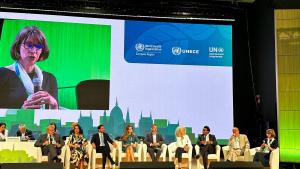
Each year, across the pan-European region, an estimated 1.4 million deaths are linked to environmental risk factors, including pollution and climate change. To accelerate collective commitments for healthier people and a sustainable future, Ministers and representatives of pan-European countries responsible for health and the environment came together under the Seventh Ministerial Conference on Environment and Health (5-7 July 2023) convened by WHO/Europe in collaboration with UNECE and UNEP, and hosted in Budapest under the patronage of the Hungarian President, H.E. Katalin Novák.
The ambitious Declaration adopted refers to various multilateral agreements and programmes supported by UNECE. In particular, it commits to supporting ratification and advancing implementation of the UNECE Convention on Long-Range Transboundary Air Pollution and its Gothenburg Protocol to help address the 569,000 annual death toll attributable to ambient air pollution; and to leverage the Protocol on Water and Health, serviced by UNECE and WHO/Europe, as a regional policy instrument supporting the implementation of national commitments, capitalizing on the technical tools and guidance developed under it. The Declaration further commits to supporting the Transport, Health and Environment Pan-European Programme (THE PEP), joinly serviced by UNECE and WHO/Europe.
In focus: Protocol tools support targeted measures to uphold human rights to water and sanitation
Faced with increasing climate change impacts, upholding the human rights to safe drinking water and sanitation for all is becoming increasingly challenging. According to a WHO/Europe report, some 77 million people still lack access to safely managed drinking water services, and annually 33,500 deaths are related to insufficient water, sanitation and hygiene (WASH) services in the pan-European region, which has stark national geographical disparities in access. The COVID-19 pandemic further showed the urgent need to address gaps in access to ensure no one is left behind.
The inter-ministerial platform of the Conference also provided an excellent platform in the cross-sectoral spirit of the Protocol to hold a parallel session devoted to the innovative tools developed under the Protocol on Water and Health.
The event From assessment to action: Realizing the human rights to water and sanitation through the Protocol on Water and Health showcased how the various guidance and tools developed drive action towards the universal human rights to safe water and sanitation. State secretaries and other high-level participants from France, Montenegro, the Republic of Moldova and Serbia reflected on their experiences in applying these practical tools in identifying areas of improvement and targeted action.
Mr Dmitry Mariyasin, Deputy Executive Secretary of UNECE, stressed the importance of the inter-ministerial approach the Protocol offers in addressing the pressing obstacles in the provision of safe WASH services. “To date, the Protocol on Water and Health has encouraged action and progress in translating the human rights to water and sanitation into practice through its various tools, guidance and regional and international collaboration in over 40 countries of the pan-European region”, he stressed.
To assess the policy landscape on equitable access to water, sanitation and hygiene (WASH), all countries represented in the panel carried out self-assessment exercises applying the Equitable Access Score-card, a tool first developed ten years ago to support countries to assess policies in place to ensure equity in access to water and sanitation, and which has already been applied in 13 countries across the pan-European region.
Data gaps and fragmented institutional responsibilities remain a challenge
The discussion concluded that the lack of data remains a significant challenge reflecting national and regional trends. The State Secretary of Health of Montenegro, Mr Vladimir Obradovic, also shed light on the fragmentation of institutional responsibilities when managing WASH services, which aggravates coordinated action. Consequently, Montenegro announced its intention to develop an action plan under the Protocol’s equitable access to water and sanitation programme area to address the identified limitations, particularly when closing the urban-rural gap in the provision of WASH services. Defining and recognizing vulnerable and marginalized communities to better manage their needs was also deemed important.
Looking forward, participants concurred that the revision process of the Equitable Access Score-card should encompass innovative approaches to better absorb variabilities arising from the climate crisis and emergency responsiveness of water service providers to safeguard the human rights to water and sanitation.

